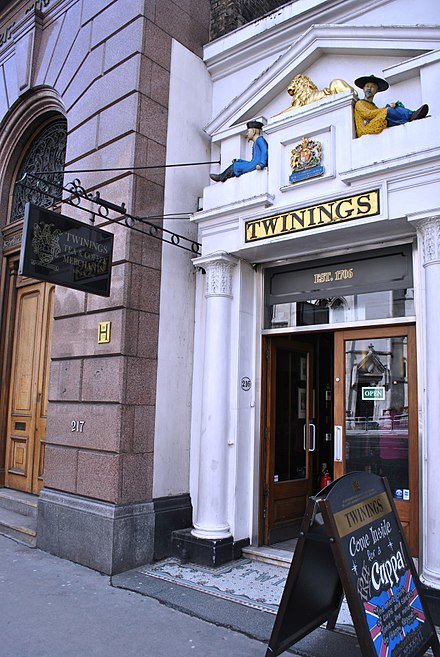British Heritage
Remember, Cherish, Learn.
beta
Twinings Tea
An Iconic Emblem of British Heritage.
Founded in the dawn of the 18th century, Twinings Tea holds an emblematic place within the annals of British history. A timeless testament to the country's long-standing affection for tea, Twinings epitomises a distinctively British tradition that reverberates through centuries. As a brand, Twinings has not only cultivated an extensive variety of tea but has also continuously adapted to the changing preferences of its customer base, always upholding its reputation for excellence. Indeed, the company’s influence in shaping the tea culture of Britain cannot be overstated.
Established in 1706, Twinings remains the original English marketer of tea. More than a business, the legacy of Twinings is interwoven with the history of the British Isles. Thomas Twining, a young entrepreneur with a spirit for innovation, purchased a Coffeehouse on London's Strand. Through his foresight and business acumen, he began to focus more on tea, which was not as popular as coffee at the time. This astute vision and his tireless advocacy for the reduction of high tea taxes culminated in Prime Minister William Pitt the Younger slashing the tea taxation from 119% to 12.5% in 1784. This watershed moment led to tea becoming the national drink of Britain, with over 100 million cups now consumed daily in the country.
An impressive aspect of Twinings is its uninterrupted presence on the Strand since its inception in 1706. Twinings holds the world's oldest continually-used company logo and is London's longest-standing ratepayer, signifying the stability and enduring legacy of this iconic brand. After the initial success of the coffeehouse, Thomas Twining expanded his business by purchasing the three adjacent properties, forming the Twinings premises of today.
Although Twinings is synonymous with tea, its product range includes other beverages such as coffee, hot chocolate, and malt drinks. Beyond their traditional varieties of black, green, and herbal teas, the brand has evolved to offer innovative products like fruit-based cold infusions. Twinings' dedication to broadening its repertoire of beverages demonstrates the brand's adaptability and commitment to satisfying the diverse tastes of its clientele.
The history of Twinings is marked by groundbreaking moments and innovative practices. Thomas Twining's journey began in Gloucestershire and led him to London at the age of nine. After serving as a weaver's apprentice, Twining worked for the East India Company, gaining invaluable knowledge and experience that later shaped his unique business model. The company's success was accelerated by Thomas Twining's introduction of dry tea sales, an innovative move that made the product more accessible and allowed for its consumption at home.
With an enduring commitment to quality, Twinings earned the prestigious honour of a royal warrant and was later acquired by Associated British Foods in 1964. While the exact genesis of the association is unclear, Twinings is also notably linked with Earl Grey tea, a unique blend infused with bergamot. In a strategic move, the company acquired Jacksons of Piccadilly, a competitor with similar connections to the bergamot blend, in the 1990s. Despite the closure of its Belfast Nambarrie plant in 2008, Twinings continues its global expansion with production centres in China and Poland, while maintaining a presence in its homeland with a factory in Andover, Hampshire.
At the heart of Twinings' ethos is its commitment to ethical sourcing. Through its Sourced with Care programme, the company endeavours to uplift the communities it sources from. As a founding member of the Ethical Tea Partnership, Twinings has worked relentlessly to monitor and enhance conditions on tea estates globally. In 2018, it responded to calls for transparency by publishing a list of all its tea suppliers in India, demonstrating its commitment to ethical sourcing and combating modern slavery.
While Twinings continues to be lauded for its clear policy on excluding GM-derived ingredients and offering some Fairtrade-certified teas, it has faced criticism due to its parent company, Associated British Foods. The Ethical Consumer Group assigned Twinings an 'F' rating due to alleged unethical practices and tax avoidance strategies by its parent company. This underscores the complex landscape businesses operate within, where they must balance profitability with ethical and sustainable practices.
As a vital strand in the rich tapestry of British heritage, Twinings Tea has and continues to shape the nation's tea-drinking culture. The legacy of this iconic brand serves as an embodiment of tradition and innovation, symbolising a quintessentially British custom that has stood the test of time.
Twinings: An English Legacy
Established in 1706, Twinings remains the original English marketer of tea. More than a business, the legacy of Twinings is interwoven with the history of the British Isles. Thomas Twining, a young entrepreneur with a spirit for innovation, purchased a Coffeehouse on London's Strand. Through his foresight and business acumen, he began to focus more on tea, which was not as popular as coffee at the time. This astute vision and his tireless advocacy for the reduction of high tea taxes culminated in Prime Minister William Pitt the Younger slashing the tea taxation from 119% to 12.5% in 1784. This watershed moment led to tea becoming the national drink of Britain, with over 100 million cups now consumed daily in the country.
A Staple on the Strand
An impressive aspect of Twinings is its uninterrupted presence on the Strand since its inception in 1706. Twinings holds the world's oldest continually-used company logo and is London's longest-standing ratepayer, signifying the stability and enduring legacy of this iconic brand. After the initial success of the coffeehouse, Thomas Twining expanded his business by purchasing the three adjacent properties, forming the Twinings premises of today.
Twinings: More Than Just Tea
Although Twinings is synonymous with tea, its product range includes other beverages such as coffee, hot chocolate, and malt drinks. Beyond their traditional varieties of black, green, and herbal teas, the brand has evolved to offer innovative products like fruit-based cold infusions. Twinings' dedication to broadening its repertoire of beverages demonstrates the brand's adaptability and commitment to satisfying the diverse tastes of its clientele.
Historical Footprints of Twinings
The history of Twinings is marked by groundbreaking moments and innovative practices. Thomas Twining's journey began in Gloucestershire and led him to London at the age of nine. After serving as a weaver's apprentice, Twining worked for the East India Company, gaining invaluable knowledge and experience that later shaped his unique business model. The company's success was accelerated by Thomas Twining's introduction of dry tea sales, an innovative move that made the product more accessible and allowed for its consumption at home.
Royal Recognition and Global Expansion
With an enduring commitment to quality, Twinings earned the prestigious honour of a royal warrant and was later acquired by Associated British Foods in 1964. While the exact genesis of the association is unclear, Twinings is also notably linked with Earl Grey tea, a unique blend infused with bergamot. In a strategic move, the company acquired Jacksons of Piccadilly, a competitor with similar connections to the bergamot blend, in the 1990s. Despite the closure of its Belfast Nambarrie plant in 2008, Twinings continues its global expansion with production centres in China and Poland, while maintaining a presence in its homeland with a factory in Andover, Hampshire.
A Commitment to Ethical Sourcing
At the heart of Twinings' ethos is its commitment to ethical sourcing. Through its Sourced with Care programme, the company endeavours to uplift the communities it sources from. As a founding member of the Ethical Tea Partnership, Twinings has worked relentlessly to monitor and enhance conditions on tea estates globally. In 2018, it responded to calls for transparency by publishing a list of all its tea suppliers in India, demonstrating its commitment to ethical sourcing and combating modern slavery.
Twinings and Associated British Foods
While Twinings continues to be lauded for its clear policy on excluding GM-derived ingredients and offering some Fairtrade-certified teas, it has faced criticism due to its parent company, Associated British Foods. The Ethical Consumer Group assigned Twinings an 'F' rating due to alleged unethical practices and tax avoidance strategies by its parent company. This underscores the complex landscape businesses operate within, where they must balance profitability with ethical and sustainable practices.
As a vital strand in the rich tapestry of British heritage, Twinings Tea has and continues to shape the nation's tea-drinking culture. The legacy of this iconic brand serves as an embodiment of tradition and innovation, symbolising a quintessentially British custom that has stood the test of time.
- Twiningsen.wikipedia.org









